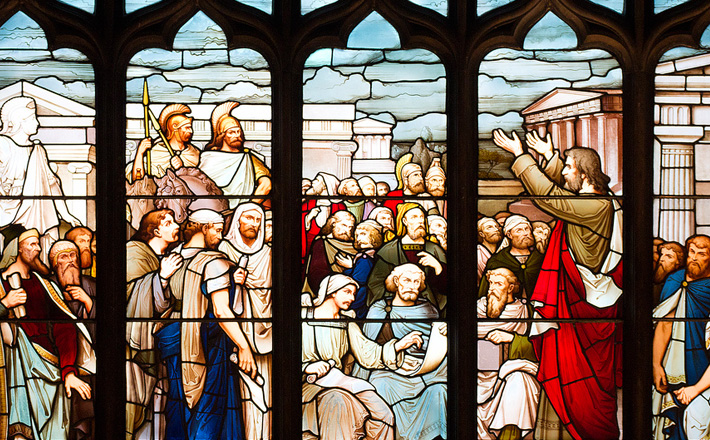Commentary on Acts 17:22-31
Today’s text occurs in Athens.
Paul has been brought here to escape violent opposition (Acts 16-17:15). In Athens, he preaches in the synagogues and marketplace (17:16-17). Epicureans bring him to the Areopagus, wanting to know more. After this speech, a few Athenians turn to Paul and to the gospel; then he departs Athens for Corinth.
The opening of today’s passage establishes Paul’s location as the Areopagus, and praises the devotion of the Athenian men gathered (17:22). Then, Luke lays out Paul’s reason for speaking: to declare the truth of the unknown God. Verses 23-26 begin Paul’s theological statement. God, Paul argues, does not dwell in buildings, nor is God served by human beings, as though the creator of all might need anything. Rather, God has made from one all peoples of the earth for the purpose of dwelling on the earth in fixed boundaries, and seeking after God who is never far away.
Luke then connects Paul’s theology with the poetry of the poet Aratus. This connects Paul’s very Jewish theology with the theology of the Gentiles, demonstrating that Paul is not babbling as the Epicureans charge (17:17). Paul continues by refuting the practice of making statues of gods, and worshiping them, for God does not take a golden, silver, or stone form. The implication of Paul’s message: people should repent from idolatry and turn to “a man” who has been raised, and who, in God’s time, will judge.
Exegetical notes
Paul stood in the midst of the Areopagus: Standing is a common posture for declamation in Acts (2:14; 5:20; 25:18; 27:21). The Areopagus is a rock outcropping downhill from the Acropolis, the temple to Athena, that served primarily as a court of law for trying homicides. Paul’s speech is political as well as religious, for the worship of the gods was a political act. He rises to declare God’s judgment in an Athenian court.
Athenian men: Speeches in ancient historiography were usually the invention of the author, in this case, the author of Luke/Acts. As with many of the speeches in Acts, Luke has Paul addressing the men rather than the entire crowd. Similar patterns can be seen in Acts 2:22, 3:12, 5:35, 7:2 and so on. This gendered language is masked by some contemporary translations.
I see you as devout in all things: In ancient rhetoric, this would be the exordium or introductory section. The purpose here is to make the audience well-disposed to hear you. Paul does so by acknowledging the devoutness of his audience.
I found an altar on which had been written, “To an unknown God”: Such altars existed in various places throughout the Roman world. Paul uses this as the launching point for his primary proposition that the God the Athenians called “unknown” was the creator of heaven and earth.
Does not live in shrines made by human hands, nor is he served by human hands: Here Luke is arguing, first, against pagan forms of worship. However, underlying his argument is a long-running theological discussion about the appropriateness of Temple worship in Judaism (2 Samuel 7:5; Isaiah 66:6), a discussion that also emerges in Stephen’s diatribe in Acts 7:48. For Luke’s audience, who heard Acts read after the fall of the Temple, the theological importance of the Temple would have been a major concern.
From one ancestor: For many, the more familiar translation is “from one blood.” The word blood (haimatos) seems to be a later addition found in the Bezae manuscript, on which the King James Version relies. The argument hearkens back to Genesis 9, in which God is said to have made the nations of the world through Noah’s three sons, and indeed back to the creation story of Genesis 2. This verse was commonly cited by abolitionist preachers to oppose the enslavement of Africans and their descendants and the segregation that arose in its wake; and to argue that all people are created equal by God.
That they would search for God: Through Paul’s speech, Luke argues that in creating humanity God’s intent was that humanity would search for God. The call to seek for God draws on themes found in Deuteronomy 4:29, Isaiah 55:6 and Jeremiah 23:23, and 29:13-14; as well as in Psalm 145:18, among other places.
In him we live and move and have our being: Luke quotes the poem Phaenomena by the Greek poet Aratus. The poem is an ode to Zeus, rather than to the God of Israel. Nevertheless, Luke excerpts it here, perhaps to give the lie to the charge that Paul was a “babbler” preaching foreign concepts (17:18).
We ought not to think that the deity is like gold, or silver, or stone: This is the crux of Luke’s argument. If we are God’s offspring, living, moving, and being in God, how can we imagine that God is like a precious metal or a stone?
He commands all people everywhere to repent: After laying out his argument, Paul turns to his peroration, or emotional appeal. This contains the first allusion to Jesus Christ in the entire speech: “a man,” appointed by God, attested to by resurrection, and who will judge God’s world with justice. Most manuscripts never mention Jesus by name.
Theological considerations
Today’s lectionary text encourages us to view the entire created order as the place of God’s dwelling. God is near to us, as close as every motion and breath, and wishes to be found by those who seek. Further, all people are God’s people. Luke makes no differentiation between the church and others. This inspires awe, and also repentance for not seeking, not paying attention to the God in whom we live, move, and have our being. Particularly, we are exhorted to repent from the human inventions we worship in place of God. Finally, the end of the vision is justice, brought about through Jesus, the man attested by God through resurrection.


May 21, 2017